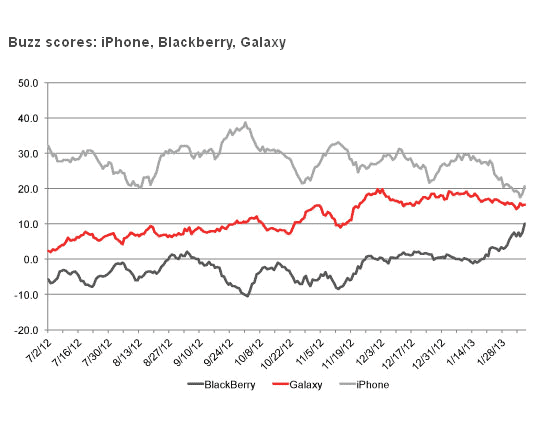Dust off the sports clichés, they are about to go into overdrive in Waterloo.
Research in Motion Monday announced that its BlackBerry 10 phones will be released on January 30th. This brings the precise timeline of the company’s most anticipated corporate test into focus for the first time. Depending upon which iteration of Research in Motion you follow, RIM or RIMM, the company is faced with either third-and-ten or a fourth down and ten, owing to the subtle differences between Canadian and American football.
The quarterback is an unproven understudy, Thorsten Heins, who has surprised some with his calm demeanor and attention to detail. But this is it. RIM has everything riding on a fourth quarter march towards the release of its new operating system, BlackBerry 10. If Heins fails to throw a touchdown, drain a three point shot, chip in for birdie from the rough, -choose your poison here- RIM will be done. Or will it? What will actually happen to the BlackBerry-maker if its new devices don’t catch on?
First of all, we have to define what success is for Research in Motion at this point. The company isn’t trying to be champion, at least not yet. BlackBerry 10, says CEO Thorsten Heins, has a clear shot at being the number three platform after iPhone and Android. Expectations are clearly much lower than that, with RIM having traded below its book value for more than a year now.
The street is not expecting much, so it won’t take much to best low expectations and reward RIM’s stock with a bump that may signal a comeback, and perhaps put an end to the ongoing RIM deathwatch.
So what would signal RIM’s return to form? What might be considered a successful launch? Byron Capital analyst Tom Astle, who last week issued a BUY recommendation with a $12 target on RIM, thinks pent up demand amongst current BlackBerry users for a modern phone will create a bit of a sales buzz on its own. He believes 20% – 25% of RIM’s 80-million subscribers will upgrade next year. That’s more than 20-million sales right there.
RIM shipped 7.4 million BlackBerry smartphones in its recently reported Q2, 2013, and 11.1-million in its first quarter. Astle thinks these numbers will fall to 6.5-million in Q3 and then 6-million in Q4, for a total of 31-million units.
___________________
This story is brought to you by Serenic (TSXV:SER). Serenic’s cash position as of its most recently reported quarter was greater than its market cap as of November 1st, which was $3.44-million. The company has zero long-term debt. Click here for more info.
_____________________
The key to RIM’s financial picture, he says, is just how far the company’s margins have eroded as its brand has suffered. RIM once pulled margins as high as 35%, but Astle is now applying 20% gross margins to BB10 devices. He thinks they will sell for about $400, well below the approximately $600 average price of an iPhone.
Astle expects RIM will lose $866 million in fiscal 2013 on revenue of $10.54-billion, but will bounce back in fiscal 2014, earning $118-million, or $.23 a share on revenue of $15.17-billion.
The wild card here is carriers. If RIM gets any kind of push from them, sales numbers for BlackBerry 10 could be much higher than the thirty million units it should book in fiscal 2013. This is a very real possibility because some industry experts believe mobile operators such as Verizon and AT&T are growing increasingly frustrated with their relationship with Apple, which has used the tremendous consumer demand for iPhone to carve out punitive deals with them.
Earlier this year, Yankee Group analyst Katie Lewis explained the current landscape.
“Mobile operators are sick of taking orders from Apple…iPhones are occupying an increasingly dangerous share of mobile operators’ smartphone sales. In 2011, iPhones represented half of AT&T’s smartphone sales, and now that Verizon has recently voiced a similar shift in sales, the companies’ fears of an Apple takeover are growing stronger.”
Cormark analyst Richard Tse, who also recently issued a BUY rating on RIM, says carriers might be encouraged by early industry feedback of BlackBerry 10, which has been surprisingly positive.Tse says RIM, being a hardware company with a consumer focus, is especially dependent upon what he calls “the power of product cycles”. Tse expects sentiment around RIM’s product cycle could help reverse its fortunes. Cormark analyst Richard Tse, who also recently issued a BUY rating on RIM, says carriers might be encouraged by early industry feedback of BlackBerry 10, which has been surprisingly positive.
But what is this all fails? The landscape for wireless device sales is incredibly competitive and RIM is paired up against none less than Microsoft for the coveted number three spot. What if BlackBerry 10 turns out to be more Ryan Leaf, less Peyton Manning?
Make no mistake, if BlackBerry 10 flops the wolves will immediately arrive at RIM’s door. The rumour mill on a RIM takeover has included companies as diverse as IBM, Facebook, Amazon, Samsung and, most persistently, Microsoft.
But here’s the bottom line: even if BlackBerry 10 completely crashes and burns, realistic breakup scenarios have the pieces of Research in Motion selling off for more than its current market capitalization, which Tuesday was $4.4-billion.
What will those looking to dice RIM into sections be looking for? First and foremost they will want RIM’s subscriber base, which despite the company’s recent troubles, has grown to more than 80-million for the first time. Astle says while it may be hard to unlock the value, the cable space values a subscriber at at $20-$25 for every dollar of monthly ARPU (Average Revenue Per User). Using this metric, RIM’s 80 million subscribers would peg its value at $7-billion. Cut that in half to account for unknowns, says Astle, and you get a realistic value of $3.5 billion.
One asset that needs no interpretation as to its value is cash. RIM has, at last check, more than half its market cap in cash. RIM ended Q2 with cash, cash equivalents, short-term and long-term investments of $2.3 billion, up from $2.2 billion at the end of the previous quarter. The company will probably burn through some of that cash, however, because the second half of fiscal 2013 is expected to be tough, and the company will need to support the launch of BlackBerry 10 with a marketing push.
Another asset that will command attention is RIM’s enterprise service unit. Bloomberg, this past summer, said IBM had approached RIM about acquiring these assets. Berenberg Bank pegged the value of the unit at between $1.5 and $2.5 billion, said the article.
Then there’s the hottest area in all of technology: patents. After Nortel’s 6,000 strong collection of patents was sold last summer for an unexpectedly high $4.5 billion to a consortium that included RIM, Apple, Sony and Microsoft, the value of patents has been a moving target, and most of that movement has been straight up.
When Motorola Mobility’s patent portfolio that was sold to Google in 2011 for $12.5-billion, analyst Kris Thompson said the transaction meant all bets were off on the price RIM’s patents might command. Thompson said the value could be as much as $10-billion.
RIM’s own estimate of its patent value, revealed in an SEC filing in July, pegged its IP value at $3.37, right around the million dollars per patent rule of thumb that pervades popular thinking on the matter today.
Add these numbers up, rejig the figures, discount this or eliminate that. Assign a value of zero to its hardware business. Any way you slice it, it’s hard to come up with a scenario in which Research in Motion is worth less than its present market value.
Whether you read about it in the financial press or on a tech blog, BlackBerry 10 is being characterized as an all-or-nothing Hail Mary pass. But it’s actually a free play for Research in Motion shareholders, who will win either way.
Related: Five reasons people will want a BlackBerry 10 Phone
____________________________
______________________________
Leave a Reply
You must be logged in to post a comment.






 Share
Share Tweet
Tweet Share
Share




Comment